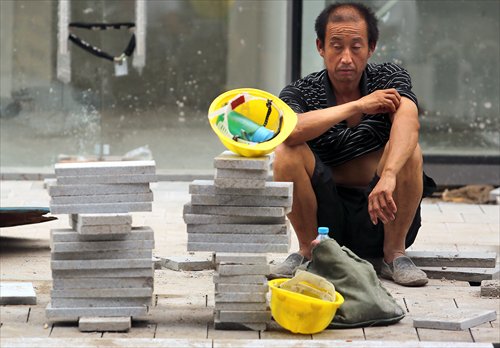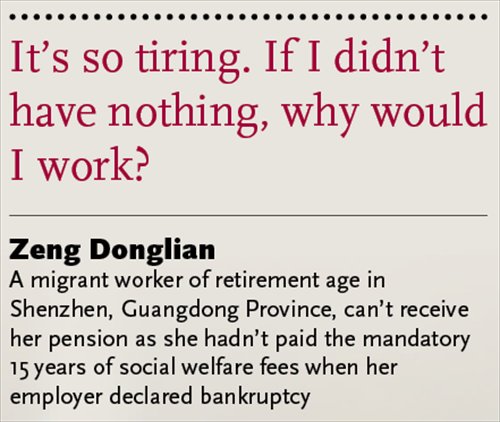Without proper pensions, 46 mln elderly migrant workers cannot retire
In line with the rest of the population, China's migrant workers are getting old. According to official data, one in six is now close to retirement age. But they can't enjoy their old age, as many lack a proper pension and have no choice but to still work even after they are eligible to retire, which leaves them unprotected by the law.

A Chinese construction worker takes a break in Beijing on August 9, 2015. Photo: IC.
Wang Changji put his arms around a 15-kilogram concrete block, held his breath, and lifted it up. Wobbling, he shuffled over to a trolley and put the block on it.
After a moving a few, he started panting heavily. But his work wasn't finished; he still had to take the trolley to another part of the construction site. Wang arched his back, leaned forward with all his might, and inched the trolley forward.
The 59-year-old clearly does not have enough strength left to do this kind of job anymore. Each day, he has to load and unload 300 blocks, in order to make a meager 150 yuan ($23).
Even though his job is backbreaking, Wang says he had no choice. He owns some land in his hometown of Shangqiu, Central China's Henan Province, but the profits from farming it can barely support his family of six. At the end of the year, he never has any savings left over. But when working on construction sites in big cities, he can save about 3,800 yuan per month. With this kind of income, he has been able to raise a son and three grandchildren.
"It's better than sitting at home and having nothing to eat," he told the China Youth Daily.
A report from the National Bureau of Statistics estimated there were about 270 million migrant workers by the end of 2014. Of these, about 46 million are over 50, meaning one out of six is rapidly approaching retirement age.
It's increasingly difficult for them to find jobs because of their waning strength and the decreasing demand for unskilled laborers, but at the same time many can't get proper pensions because of the temporary and mobile nature of their work. After they retire, many will be left without sufficient support.

Hard to find work
Wang has worked on this construction site in Shanghai for a few months. Before this job, he worked at numerous other sites. Along the way, he's met many migrant workers who are his age or even older.
He remembers when he first applied for this job, he had to butter up the project's team leaders and convince them he is in excellent health. Even during hot summer days, he didn't dare to rest in front of his team leaders.
Sixty-year-old Li Xunian spends most of his time waiting around for employers to choose him at Andemen, a migrant workers' job market in Nanjing, East China's Jiangsu Province. He has been out of work for more than a month.
He has worked in the cement industry his whole life and has damaged both shoulders. Right now, he wants to find an easier job as a security guard, but because he's old, nobody wants to hire him.
"Most people just look at my white hair and immediately walk away," he said. "Maybe I should get some hair dye?"
These migrant workers come from villages and most didn't receive a full adult education before they went out to the big cities to find jobs. This limits the type of work they are capable of doing.
A Nanjing-based migrant worker surnamed Wu told the Global Times he only has a high-school diploma and has been working at a restaurant making tofu for more than 10 years. The job requires him to work from 10 pm till 6 am the next day in a humid, enclosed room.
Even though the conditions are rough, Wu said he will persist for another few years, because the pay is relatively good. He receives 3,000 yuan a month and free room and board at the restaurant, which is much more than people who work in factories or as babysitters in his region can get.
Besides, he doubts he can get a better job with his level of education.
Social welfare dilemma
The reason these men have continued working is they have no pension or other proper welfare benefits to support them in their old age.
Right now, there are two major categories in China's pension system, urban and rural, and people can apply to switch between the two.
The urban welfare system, which migrant workers fall into if they work in a city, is based on fees paid into the system. In order to receive a pension, one needs to have consecutively paid 15 years of social welfare fees.
But many migrant workers fall between the gaps in this system. In China, social welfare fees are paid both through one's salary and by one's employer, but migrant workers switch jobs and even cities very often, and it's difficult for them to switch their local welfare accounts from one place to another. Therefore, not many migrant workers go through the bureaucratic hassle of paying the fees.
Besides, for many migrant workers it's easier to deal in cash.
Fu Cheng, director of the sociology department of the Jilin Social Science Institute, told the China Youth Daily that "farmers would rather have cash. They don't trust the system as they are aging, afraid it isn't something they rely on."
Zeng Donglian found herself in this exact situation. She worked at a toy factory in Shenzhen, South China's Guangdong Province and the factory started paying for her pension in 2006.
The year before she planned to retire, the factory declared itself bankrupt. Because she hadn't paid 15 years of social welfare fees, she couldn't receive her pension. Furthermore, because she had paid into the system for under 10 years, she couldn't continue paying the fees to top it off. She was laid off, and had to find another job and save up for her old age.
"It's so tiring. If I didn't have nothing, why would I work?" she told China Youth Daily.
Li also feels that he is forced to find work. He hasn't paid enough fees to qualify for an urban pension, and can only receive a monthly pension from the rural system, which is far from enough.
How the size of one's rural pension is determined is through how much one pays into the rural system. But compared with urban pensions, it's not much, only few hundred yuan a month at most with some pensions amounting to less than 200 yuan a month.
Furthermore, a few years ago, his village was demolished to make way for urban development projects and he lost his farmland in the process.
If he can't find a job, he will have no other way of making a living.
New proposal
Currently, the retirement age is 50 or 55 for women and 55 or 60 for men, with blue-collar workers eligible to retire earlier than white-collar workers.
Because of these pension problems, many migrant workers still try to work and save up money even after they reach retirement age. Media reports of people who dye their hair black or wear fashionable clothes to appear younger, in order to find jobs, are not uncommon.
But this also creates issues because people over the retirement age are not protected by the law if they still work. When accidents or work disputes happen, they are not covered by the country's labor law.
As the average age of migrant workers is increasing, so many companies are loosening their standards, a staff member at migrant worker's job market in Nanjing told the Contemporary Express. Ten years ago, when restaurants recruited waiters, they limited the age of applicants to 28. But now, the age limit has been extended to 45.
But at the same time, many companies still set the ceiling at 55 years old, because the law dictates men should retire at 60.
Besides, the demand for unskilled workers has shrunk. The staff member told the Contemporary Express that from market surveys, most migrant workers over 50 can only find jobs like babysitting or street-sweeping.
There have been calls for the Chinese government to solve the issue for this sizeable segment of society.
During this year's two legislative sessions, the issue of pensions was brought up. Wang Xin, a deputy to the National People's Congress told media she brought forward a proposal to protect migrant workers' rights. She proposed the 15-year payment threshold should be canceled, to make it easier for workers to get urban pension.
But right now, there isn't a definite timeline for these plans.
Wang Jichang and his workmates never really think that far in the future. They say they will eventually choose to go back to their rural hometowns to spend their senior years there, regardless of whether they'll receive a sufficient pension.
"Our government has good policies, but we still should rely on ourselves, there are so many people in China, how can the government afford to feed them all?" one of his workmates told the China Youth Daily.
Agencies - Global Times
Newspaper headline: White-haired workers